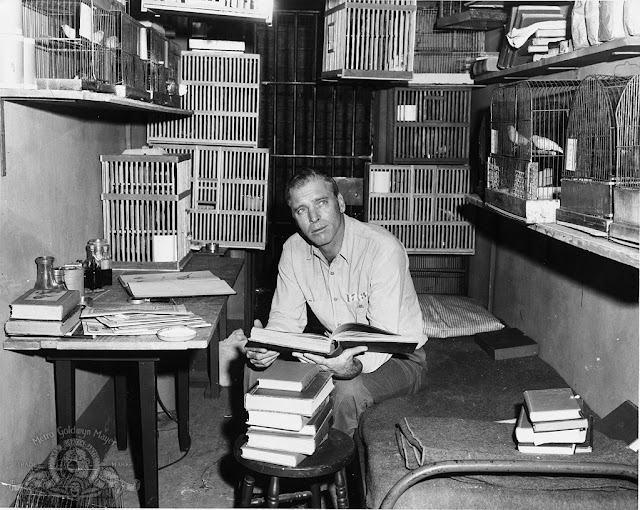"It was a time of tremendous tension and tremendous fear." - John Frankenheimer
Cold War stories are endlessly fascinating. There is something about the fear of nuclear annihilation and how it alters our perspectives on the future and guides our actions that became the perfect fodder for storytelling. It inspired authors Fletcher Knebel and Charles W. Bailey II to write their political thriller Seven Days in May. Published in 1962, the book became a bestseller. Shortly after publication, Kirk Douglas’ Joel Productions and director John Frankenheimer's Seven Arts Production purchased the movie rights in a joint deal. The book was highly criticized by the Pentagon but it had one notable fan: President John F. Kennedy. According to Kirk Douglas’ memoir Kirk and Anne, JFK met Douglas at an event hosted by LBJ and encouraged him to make the film. JFK also gave Frankenheimer his approval to film outside of the White House.
In the not so distant future, U.S. President Lyman (Fredric March) has signed a peace treaty with the Soviet Union, a move intended to prevent nuclear war, and is dealing with the aftermath of his decision. His approval rating has dropped to 29% and he’s garnered much criticism within the current administration. His biggest critic is General Scott (Burt Lancaster), one of the Joint Chiefs of Staff. A highly decorated military veteran, Gen. Scott has stirred up the opposition with his patriotic banter and his extreme right-wing politics. His aide Colonel ‘Jiggs’ Casey (Kirk Douglas) doubts his boss’ intentions and discovers a big secret. In seven days, Gen. Scott and the other Joint Chiefs of Staff will stage a military coup to seize the government and overthrow the President. Two of the president’s closest confidantes, his aide Paul Girard (Martin Balsam) and Senator Clark (Edmond O’Brien) are sent to investigate. Jiggs gets some help from Eleanor Holbrook (Ava Gardner), Scott’s ex-lover. She has in her possession letters that will incriminate Scott. Will Jiggs and the President’s team be able to uncover the plot and stop it before the seven days are up?
"The enemy's an age. A nuclear age. It happened to kill man's faith in his ability to influence what happens to him. And out of this comes a sickness, a sickness of frustration, a feeling of impotence, helplessness, weakness. And from this desperation, we look for a champion in red, white and blue. Every now and then, a man on a white horse rides by, and we appoint him to be our personal god for the duration." - President Lyman, played by Fredric March
Seven Days in May (1964) is one of the finest political thrillers ever made. Frankenheimer’s film is beautifully shot and directed. Frederic March, Burt Lancaster, Kirk Douglas, among others, deliver stellar performances. I’ve watched this film several times but this recent viewing made me appreciate the pivotal March-Lancaster showdown even more than I had before. Every single second of that scene is powerful. If you’re not already a Fredric March fan, that one scene will make you a convert. Lancaster’s Gen. Scott is so calm that it’s incredibly gratifying seeing March’s President Lyman break him down. The film benefits from Rod Serling's terrific screenplay, a high caliber cast of players, amazing sets, a title sequence by Saul Bass, etc. It’s perfectly paced, brilliantly told and it reflects the real tension felt in America at the time. There is so much attention to detail but also a focus on the story at hand. There is no excess. Everything feels just right. In terms of Cold War movies, I’ll take Seven Days in May (1964) and Fail-Safe (1964) (review) over the more popular Dr. Strangelove (1964) and The Manchurian Candidate (1962) any day.
Seven Days in May (1964) is available on Blu-Ray from the Warner Archive Collection and can be purchased at the WB Shop. When you use my buy links you help support this site. Thank you!
The film has been remastered and is presented in 1080p HD. The Blu-Ray edition is crisp, clear and simply stunning. It includes a great commentary track by director John Frankenheimer who generously offered much information about the making of the film. I learned a whole lot from hearing him discuss various topics including:
- his experience working with the different actors
- his collaboration with JFK
- his background working for the Pentagon and how that influenced the set design
- why he preferred shooting in black-and-white
- descriptions of the different shots and angles
- how they used European cars so audiences wouldn’t recognize the vehicles and date the film
Warner Archive Wednesday - On (random) Wednesdays, I feature titles from the Warner Archive Collection. Thank you to Warner Archive for sending me copy of Seven Days on May on Blu-Ray (hey that rhymes)!


























